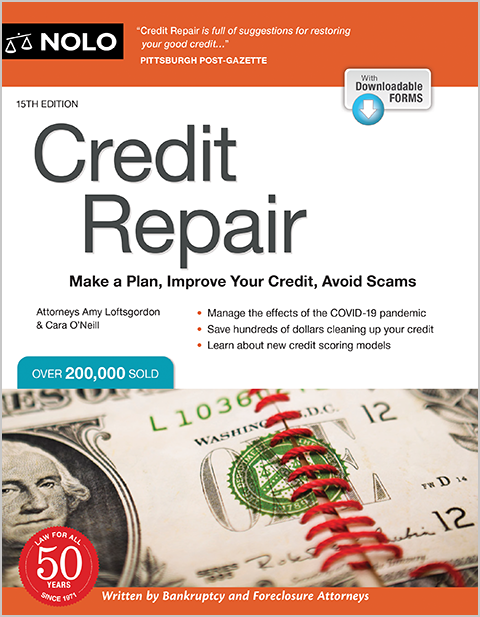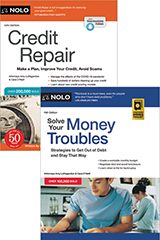Credit Repair
Make a Plan, Improve Your Credit, Avoid Scams
- Product Details
- prioritize debts and create a budget
- reduce debts and cut expenses
- negotiate with creditors
- correct credit report errors and remove old information
- add positive information to your credit report
- adopt strategies to rebuild your credit, and
- avoid identity theft and credit repair scams.
- Form F-1 Request Credit Report
- Form F-2 Request Reinvestigation
- Form F-3 Request to Furnishing Creditor to Reinvestigate
- Form F-4 Request Follow-Up After Reinvestigation
- Form F-5 Request Removal of Incorrect Information by Creditor
- Form F-6 Creditor Verification
- Form F-7 Request Addition of Information Showing Stability
- Form F-8 Request Addition of Account Histories
- Form F-9 Monthly Income
- Form F-10 Your Debts
- Form F-11 Daily Expenses
- Form F-12 Payments to Savings and Debt Reduction
- Form F-13 Monthly Budget
- Form F-14 Inform Creditor of Judgment Proof Status
- Form F-15 Request Short Term Lower Payments
- Form F-16 Request Long Term Lower Payments
- Form F-17 Request to Pay Nothing Short-Term
- Form F-18 Request to Pay Nothing Long-Term
- Form F-19 Request Rewrite of Loan Terms
- Form F-20 Offer (Delayed) Payment of Past Due Amounts
- Form F-21 Offer (Reduced) Lump Sum Payment
- Form F-22 Offer Payment Schedule to Pay Off (Reduced) Debt
- Form F-23 Cashing Check Constitutes Payment in Full (Outside of California)
- Form F-24 Cashing Check Constitutes Payment in Full—First Letter (California)
- Form F-25 Cashing Check Constitutes Payment in Full—Second Letter (California)
- Form F-26 Cashing Check Constitutes Release of All Claims
- Form F-27 Offer to Give Secured Property Back
- Form F-28 Request Direct Negotiation With Creditor
- Form F-29 Request for Verification of Debt/Identity of Original Creditor/Return of Debt to Original Creditor
- Form F-30 Complaint about Debt Collector Violation of Law
- Form F-31 Debt Collector: Cease All Contact
- Form F-32 Request for Basis of Unfavorable Credit Offer or Action
- Form F-33 Identity Theft Dispute Letter for Existing Accounts
- Form F-34 Identity Theft Dispute Letter for New Accounts
- Form F-35 Notice of Billing Error Dispute on Credit Card Bill
- Form F-36 Notice of Claim or Defense Dispute on Credit Card Bill
- Identity Theft Victim’s Complaint and Affidavit
- Annual Credit Report Request Form
- FTC Law Enforcement Cover Letter
- About the Author
- Table of Contents
- How Creditors Evaluate Your Creditworthiness
- Credit Reports and Credit Scores: What Are the Differences?
- Your Credit Reports
- Getting Your Credit Reports
- What Is in a Credit Report?
- Investigative Reports
- Who Can Look at Your Credit Report
- Your Credit Score: What It Is and Why It Matters
- How Credit Scores Are Calculated
- What Credit Score Do You Need to Get Credit?
- Getting Your Credit Score
- Common Errors in Credit Reports
- Your Right to an Accurate Credit Report
- Review Your Report for Errors and Incomplete or Prohibited Information
- Dispute Incomplete and Inaccurate Information
- Add an Explanatory Statement to Your Credit File
- Add Positive Information to Your Credit Report
- Check Your Credit Reports Often
- Avoid Credit Repair Clinics
- How to Assess Your Financial Situation
- Determining Your Credit Repair Options Based on Your Financial Situation
- Cutting Expenses
- Reducing Current Debt Obligations
- Reducing Mortgage Debt
- Filing for Bankruptcy
- Ways to Raise Money
- Options to Avoid
- Prepare a Plan
- Negotiating With Creditors and Debt Collectors
- Dealing With Debt Collectors
- Tax Consequences of Forgiven Loans
- Avoid Most Debt Relief Services
- How Does a Debt Management Plan Work?
- Debt Management Plans vs. Chapter 13 Bankruptcy
- Choosing a Good Credit Counseling Organization
- After You’ve Chosen an Agency, Monitor Your Plan
- First Steps to Rebuilding Credit
- Ways to Improve Your Credit History Without Getting New Credit
- Next Step to Rebuilding Credit—Getting New Credit
- Putting It All Together: Preventing Future Financial Problems
- Be on Guard for Credit Discrimination
- Choosing Credit Cards
- Using Credit Cards: How to Protect Yourself
- The Crime of Identity Theft: The Scope of the Problem
- What’s in a Stolen Name?
- How Can an Identity Be Stolen?
- How to Protect Yourself
- Protecting Your Social Security Number
- If Your Identity Is Stolen
- Identity Theft Protection Products and Insurance
- Debtors Anonymous
- Nolo Publications
- Other Publications
- Online Resources
- Where to Complain: Federal Agencies
- State Consumer Protection Agencies
- Editing RTFs
- Downloadable Forms Available on the Nolo Website
- Sample Chapter
- Forms
Bad credit can get better
A bad credit report can prevent you from getting a mortgage, car loan, credit card, apartment, or even a job. The sensible strategies in Credit Repair help you take control of your finances, clean up your credit report and rebuild your credit. Learn how to:
Updates to the 15th edition of Credit Repair include new credit reporting standards for medical debts and revised rules about what debt collectors must include in collection notices.
“Credit Repair is full of suggestions for restoring your good credit…”—Pittsburgh Post-Gazette
“A high quality, do-it-yourself approach”….—Reuters
Forms and Letters
Your Credit Repair Companion
1. The Elements of Repairing Credit
2. Credit Reports and Credit Scores: The Nuts and Bolts
3. The First Step to a Better Credit Score—Cleaning Up Your Credit Report
4. Assess Your Financial Situation
5. Reducing Current Expenses and Debts
6. Finding Money to Pay Your Debts
7. Negotiating With Creditors and Debt Collectors
8. Getting Help Negotiating and Managing Debts
9. Building Positive Credit History
10. Choosing and Using Credit Cards
11. Avoiding and Dealing With Identity Theft
Appendix A: Resources
Appendix B: Additional State Protections Concerning Credit Repair Clinics
Appendix C: How to Use the Downloadable Forms on Nolo.com
Index
Chapter 1: The Elements of Repairing Credit
Credit repair is not a quick fix. Some steps will require hard work, and you might have to wait until your finances are under control before diving in, but others are reasonably simple. In both cases, this book provides the support you’ll need throughout your credit repair journey. We walk you through your options, warn you about pitfalls that could worsen your situation, and give you sample letters and forms you can refer to when you need to contact creditors, debt collectors, credit reporting agencies, and others. Here’s what you can expect.
First steps: Learning about your credit report and assessing your financial situation (Chapters 2, 3, and 4). You’ll want a clear picture of your current financial situation and credit history before beginning. You’ll start by learning about credit reports and the factors involved in credit scoring. Chapter 2 covers how to get and review credit reports. Chapter 3 addresses fixing errors and explains how adding positive information increases reporting accuracy.
You’ll also learn why it’s essential to analyze your finances and create a budget. Once complete, you’ll be ready to determine whether it’s time to implement credit repair strategies.
Next steps: Getting your income, debts, and expenses into balanc e (Chapters 5 and 6). The most direct way to improve your credit is simple: Pay your bills on time. But it’s also one of the hardest things to do after experiencing financial problems. These chapters cover why you’ll likely need to lower your debts and increase your income before saving money. We also explain how foreclosure and bankruptcy could impact your credit history while steering you away from scammers ready to take your money and derail your credit repair efforts.
Paying and negotiating debts (Chapters 7 and 8). Negotiating with creditors can help you settle debts for less, get better payment terms, and delete negative credit entries. In Chapter 7, you’ll learn about negotiation goals and techniques. Chapter 8 explains how to find legitimate credit counseling and debt relief services and avoid the rest.
Stepping toward the future: Rebuilding and protecting your credit profile (Chapters 9, 10, and 11). Chapter 9 recommends ways to improve your credit profile without getting additional credit. And, when you’re ready to use credit again, Chapter 10 provides information on choosing and safely using credit and debit cards. Finally, Chapter 11 covers identity theft and keeping credit secure so you can enjoy the benefits of your hard work.
We hope you enjoyed this sample chapter. The complete book is available for sale here at Nolo.com.
This Book Comes With a Website
Nolo’s award-winning website has a page dedicated just to this book, where you can:
DOWNLOAD FORMS - All forms in this book are accessible online. After purchase, you can find a link to the URL in Appendix D.
KEEP UP TO DATE - When there are important changes to the information in this book, we will post updates
And that’s not all. Nolo.com contains thousands of articles on everyday legal and business issues, plus a plain-English law dictionary, all written by Nolo experts and available for free. You’ll also find more useful books, software, online services, and downloadable forms.
Customers Who Bought This Item Also Bought
Make a Plan, Improve Your Credit, Avoid Scams

 Available as part of
Available as part of 